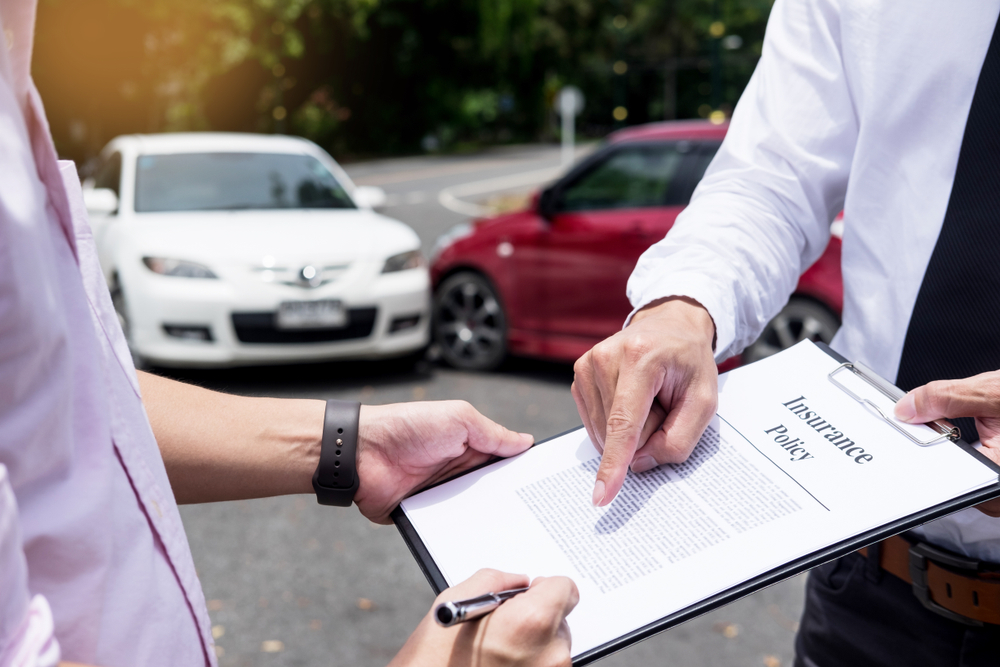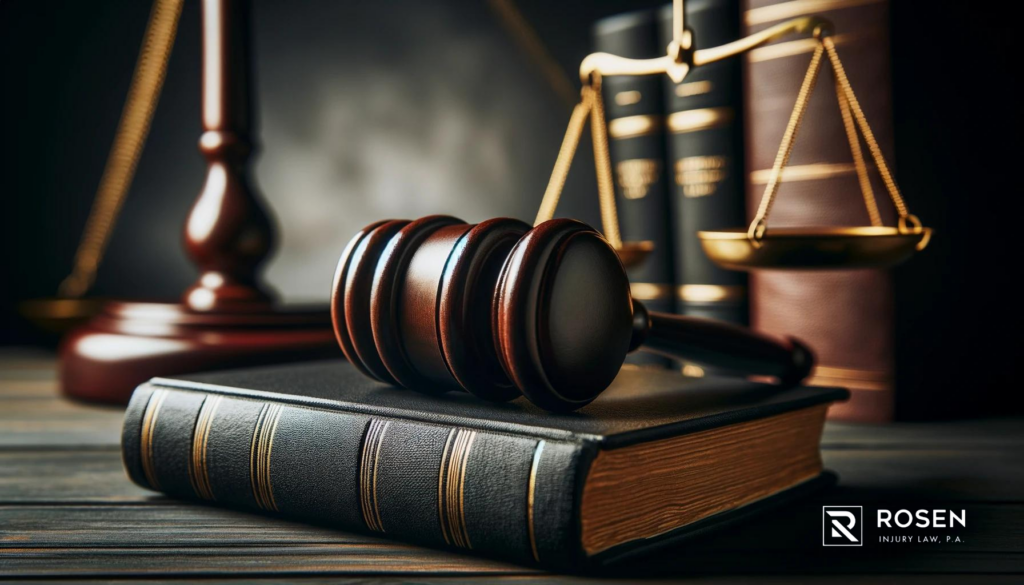
Car accident settlements tend to take one to two years after the filing of a lawsuit. However, some cases settle sooner while others take longer. For instance, a simple case with minor injuries and a lower value may settle within a few months after brief negotiations with other driver and the insurance company.
On the other side of the spectrum, a complex case worth a vast amount of money may settle on the eve of the trial after several years of litigation. Alternatively, the case may settle in the appeals process, which adds several years to the litigation.
Most car accident cases settle before trial. At Rosen Injury Law, we investigate claims and gather the evidence we need to win in court. As a result, insurance companies need to cut their losses and settle without the astronomical expense of a trial and appeal.
The length of time for your case depends on at what stage it settles.
Understanding the Timeline of a Car Accident Settlement in Florida
The duration of a car accident settlement process in Florida hinges on various factors, making it imperative to understand the stages involved and the complexities that might extend the timeline.

Early Stages: Insurance Claims and Initial Negotiations
Initially, the focus is on dealing with insurance companies. This phase involves submitting a claim, which is followed by an investigation by the insurance company. The outcome can be significantly influenced by the clarity of fault, the documentation of injuries, and the presentation of evidence. It’s crucial for victims to meticulously document their injuries, medical treatments, and any correspondence with insurance companies, as this documentation can significantly impact the settlement process.
The Role of Evidence in Strengthening Your Case
Gathering compelling evidence is paramount. This includes medical records, police reports, witness statements, and any photographic or video evidence of the accident scene and the damages incurred. Rosen Injury Law, P.A. emphasizes the importance of a thorough evidence collection to build a strong case that can either lead to a favorable pre-lawsuit or settlement offer or be persuasive in court.
Dealing with Comparative Negligence in Florida
Florida’s comparative negligence law adds a layer of complexity to car accident compensation claims. Understanding how your own potential fault in an accident can affect your car accident settlement amounts is vital. The law firm can navigate these legal nuances to ensure that your compensation is maximized, despite any partial fault that may be assigned to you.
Special Considerations for Severe Injuries
Cases involving severe or catastrophic injuries often entail longer than average settlement times due to the extensive evidence required to quantify these damages accurately. Rosen Injury Law, P.A. is adept at handling such complexities, ensuring that all future medical costs, loss of earning capacity, and physical pain and suffering are thoroughly accounted for in the settlement negotiations.
The Litigation Process: When Settlements Stall
If negotiations with insurance companies stall or if the offered compensation is inadequate, filing a lawsuit might be the next step to seek compensation elsewhere. This process, from the accident settlement process to filing the complaint to the discovery phase and possibly trial, can be lengthy. However, it is sometimes necessary to secure fair compensation. Rosen Injury Law, P.A. is prepared to navigate these legal waters, advocating for your rights at every step.
Maximizing Your Settlement Through Skilled Negotiation
Skilled negotiation is key to achieving a favorable injury settlement. Rosen Injury Law, P.A. employs negotiation strategies that leverage the evidence and legal arguments in your favor, aiming to secure the best possible outcome without the need for a trial. However, they stand ready to take your case to court if necessary.
Settlement Before Trial: A Common Resolution
The majority of personal injury cases, including car accidents, settle before reaching trial. Settlements at this stage benefit from the complete discovery process, where both sides have a clear understanding of the evidence and the potential outcomes of a trial. Rosen Injury Law, P.A. works diligently to negotiate a settlement that reflects the full value of your serious personal injury lawsuit or claim, taking into account all your damages, from medical expenses to emotional distress.
Pre-Lawsuit Settlements (One to Three Months or more) in Florida

The quickest settlements happen when you come to an agreement with the insurance company without filing a lawsuit. Pre-lawsuit settlements for car accident claims in Florida are sometimes more manageable because it is a no-fault state.
However, no-fault only applies to economic damages. When you have a car accident case sustained a severe injury with extensive general damages, settling the case without going to court is far rarer.
What Is No-Fault Car Insurance in Florida?
Florida’s no-fault car insurance law requires each motorist’s insurer to pay their full economic damages. As a result, when most car accident claims and the brunt of the damages fall into this category, it can be easier to settle a claim without going to court. Because the insurance company has less at stake, it is sometimes more likely to settle without the expense of a legal defense.
On the other hand, sometimes insurance adjusters claim that you are at fault driver entitled to nothing above the economic damages paid by your insurer. For auto accident settlement for instance, they may claim you have no general damages or that you are at fault for the collision. Therefore, you are entitled to nothing.
Alternatively, in car accident lawsuit the adjuster may claim you have partial fault. Under Florida’s comparative negligence law, your settlement from the defendant’s insurer is reduced by the percentage average settlement amount of fault you contributed to the accident.
For instance, suppose the opposing insurance company’s adjuster claims you were 40% at fault for the auto accident. If true, you are entitled to just 60% of your general damages, a low figure.
A personal injury lawyer can intercede here and insist you are entitled to a settlement and negotiate for a higher figure.
However, if the insurance company continues to balk, you’ll need to take them to court to win a fair settlement.
What Are Economic Damages?
Economic damages consist of the accident’s direct financial cost to the plaintiff. Because there is a clear line between the injury and a specific dollar figure of loss, economic damages are the easiest to calculate.
Economic damages include the following:
-
Medical expenses
-
Rehabilitation costs
-
Lost income
-
Property damage
Because Florida is a no-fault state, your insurance company bears responsibility for paying 100% of these damages. It makes no difference in insurance coverage who is at fault. Your insurer must pay your medical costs and compensate you for any lost income.
While this sounds easy, sometimes your insurance company offers too little. The insurance adjuster may quibble about what expenses related to the car accident claim are, for example. If you need help collecting the full amount from your insurance company, contact Rosen Injury Law immediately.
What Are General Damages in Florida?
Florida’s no-fault car insurance rule offers no provision for general damages. To receive them, you must a car accident lawyer file a claim with the opposing insurance company. They may refuse to pay general damages or offer only a portion of what the car accident lawyers say you deserve.
General damages include the intangible impacts of the personal injury claims. Though there are no medical bills lost wages or income statements to correspond to general damages, they are genuine losses for the sufferer. They include the following:
-
Pain and suffering
-
Emotional distress
-
Loss of enjoyment of life
-
Loss of consortium
Negotiating With the Insurance Company Pre-Lawsuit

After injury accidents, the insurance companies investigate the claim and render a decision. This generally takes about 30 days. If your damages from car accident injuries are only economic and not personal injury attorney your insurance company pays them in full, you have received your total compensation.
However, most personal injury claim victims have pain and suffering and other general damages. To ensure you are receiving all the pain and suffering damages to which you have entitlement, consult a personal injury lawyer, who can evaluate your case and determine if the claim’s decision is fair to you.
If not, your lawyer may open negotiations with the insurance company. Depending on the case, these negotiations may take several weeks to months.
When the insurer refuses reasonable terms, you must take the case to court to receive what is fair. Under Florida law, you have two years from the injury or your awareness of it to file a lawsuit.
There is no reason to delay filing a lawsuit if negotiations go nowhere. Each day you delay only increases the time before you receive the compensation you need.
Settlement During Discovery (Six Months to Two Years From Filing the Lawsuit)
Filing the complaint starts the court process. First, your personal injury lawyer draws up the complaint, which describes what occurred and delineates the laws under which you are bringing suit. Then, after the initial court appearance, the discovery process begins.
During discovery, each side must reveal the evidence it has gathered to the other. There can be no surprises. The court bars lawyers from using evidence at trial that it failed to disclose during discovery.
Each side must also disclose evidence favorable to the opposition. For example, if the defendant has a witness statement helpful to the plaintiff, it cannot hide this evidence; it must disclose it to the plaintiff’s legal team.
Settlement negotiations occur throughout the discovery process, and the parties can come to terms at any point. Often, sharing evidence motivates one or both sides to settle the claim.
The first stage of discovery consists of document discovery. During this time, the lawyers must exchange all documentation related to the case. Also, lawyers may seek evidence from third parties.
Lawyers then prepare written questions for the other side’s witnesses. These include requests to affirm or deny material facts and interrogatories, which are more open-ended questions. This process refines what each witness will attest to at trial. As a result, lawyers gain a clearer understanding of the other side’s strengths and weaknesses. Often, this enhanced understanding induces settlements.
Discovery culminates with depositions. Depositions are face-to-face interviews of opposing witnesses. Lawyers use these sessions to develop additional evidence for their claims and tie down witnesses to their stories. In addition, what occurs in depositions often motivates settlements.
Insurance companies recognize that depositions are an expensive proposition. However, up until they occur, the defense has relatively low legal costs.
Once depositions start, the insurer will become responsible for hefty fees. As a result, many cases settle before depositions. When the defense fees depositions are unlikely to help its case, it is motivated to settle rather than pay their high cost.
If insurance companies refuse to settle pre-depositions, Rosen Injury Law finds ways to motivate them after depositions. Our legal eagles ask the difficult questions that force the other side to reveal valuable evidence. Also, we pin them down to a fact pattern that makes their liability clear.
At the same time, our legal team meticulously prepares our witnesses for their depositions. They fully understand how to answer questions and prevent defense lawyers from shaking their confidence. As a result, when depositions are over, defense lawyers leave disappointed.
Because of poor results from depositions, the defense is often motivated to settle soon after their completion.
Settlement Conferences in Florida
Settlement conferences bring both sides together in one room to hash out a deal. Post-discovery settlement conferences often succeed because all of the evidence has been gathered and disseminated. Both sides have a complete understanding of the case, and the result of a trial seems more certain.
Judges often order settlement conferences before a trial. This is an attempt to bring the sides together without calling a jury. At this stage, lawyers have a good idea of how a trial will end. As a result, these conferences tend to end in a settlement when the insurance company is willing to provide a reasonable settlement amount. However, when the defense refuses to offer a fair number, it’s advantageous for the plaintiff to opt for a trial.
Car Accident Settlement Trials

Few personal injury cases go to trial. Insurance companies would only dig their financial hole deeper.
But a small number of cases do wind up before a jury. Though the cases have arrived at trial, some settle before the jury reaches a verdict.
Appeals
Personal injury appeals may be based on overturning the jury’s verdict or reducing the award. The appeals process is long and arduous. When the defense loses at trial, their chances of success are limited. As a result, they may be willing to settle the case during the appeals process.
Personal injury cases usually end in a settlement. On average, settlements with personal injury lawyers occur within one to two years after the filing of a lawsuit. During this time, lawyers complete discovery and gain a full view of the case. With expenses mounting, insurance companies become more motivated to settle. At this point, they know they are likely to lose at trial, and continuing to litigate makes the matter more expensive.
Rosen Injury Law helps Florida car accident victims attain the compensation they deserve. We fight hard, so our clients can collect every penny they are entitled to. Contact Rosen Injury Law for a free consultation.
The Importance of Legal Representation
Having experienced legal representation is crucial throughout the typical car accident settlement process. Rosen Injury Law, P.A. provides the expertise needed to navigate the complexities of most car accident injury settlements in Florida, ensuring that your rights are protected and you receive the compensation you deserve.
Take the First Step Towards Justice and Recovery
If you or a loved one has been affected by a car accident in Florida, remember, you’re not alone on this journey. The path to compensation and recovery may seem daunting, but with Rosen Injury Firm, P.A. by your side, you can navigate it with confidence. Our experienced legal team is committed to providing personalized, compassionate service while aggressively pursuing the compensation you deserve.
Don’t let the complexity of the legal process deter you from seeking justice. Contact Rosen Injury Firm, P.A. today for a free, no-obligation consultation. Let us help you understand your rights, explore your options, and take decisive action towards a positive outcome. Together, we can turn the page towards recovery and closure.
Call us now or visit our website to schedule your consultation. Your journey to recovery starts with a single step – let Rosen Injury Firm, P.A. guide you through it.
Related Content: How Long Does a Personal Injury Lawsuit Take in Florida?